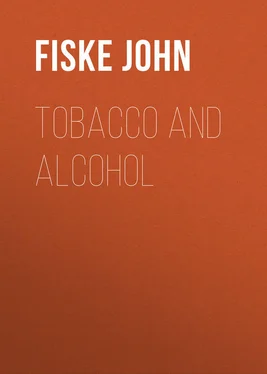John Fiske - Tobacco and Alcohol
Здесь есть возможность читать онлайн «John Fiske - Tobacco and Alcohol» — ознакомительный отрывок электронной книги совершенно бесплатно, а после прочтения отрывка купить полную версию. В некоторых случаях можно слушать аудио, скачать через торрент в формате fb2 и присутствует краткое содержание. Жанр: foreign_antique, foreign_prose, на английском языке. Описание произведения, (предисловие) а так же отзывы посетителей доступны на портале библиотеки ЛибКат.
- Название:Tobacco and Alcohol
- Автор:
- Жанр:
- Год:неизвестен
- ISBN:нет данных
- Рейтинг книги:4 / 5. Голосов: 1
-
Избранное:Добавить в избранное
- Отзывы:
-
Ваша оценка:
- 80
- 1
- 2
- 3
- 4
- 5
Tobacco and Alcohol: краткое содержание, описание и аннотация
Предлагаем к чтению аннотацию, описание, краткое содержание или предисловие (зависит от того, что написал сам автор книги «Tobacco and Alcohol»). Если вы не нашли необходимую информацию о книге — напишите в комментариях, мы постараемся отыскать её.
Tobacco and Alcohol — читать онлайн ознакомительный отрывок
Ниже представлен текст книги, разбитый по страницам. Система сохранения места последней прочитанной страницы, позволяет с удобством читать онлайн бесплатно книгу «Tobacco and Alcohol», без необходимости каждый раз заново искать на чём Вы остановились. Поставьте закладку, и сможете в любой момент перейти на страницу, на которой закончили чтение.
Интервал:
Закладка:
Throughout Mr. Parton's rhapsody, the main question, the question chiefly interesting to every one who smokes or wishes to smoke, is uniformly slurred over. Upon the question whether it is unhealthy to smoke, the Encyclopædias which Mr. Parton has consulted do not appear to have helped him to an answer. Yet this is a point which, in making up our minds about the profitableness of smoking, must not be taken for granted, but scientifically tested.
What, then, does physiology say about this notion – rather widespread in countries over which Puritanism has passed – that the use of tobacco is necessarily or usually injurious to health? Simply that it is a popular delusion – a delusion which even a moderate acquaintance with the first principles of modern physiology cannot fail to dissipate. Nay, more; if our interpretation shall prove to be correct, it goes still further. It says that smoking, so far from being detrimental to health, is, in the great majority of cases, where excess is avoided, beneficial to health; in short, that the careful and temperate smoker is, other things equal, likely to be more vigorous, more cheerful, and more capable of prolonged effort than the man who never smokes.
We do not pretend to know all this, nor are we "as certain of it as that two and two make four." Such certainty, though desirable, is not to be had in complex physiological questions. But we set down these propositions as being, so far as we can make out, in the present state of science, the verdict of physiology in the matter. Future inquiry may reverse that verdict; but as the physiologic evidence now stands, there is a quite appreciable preponderance in favor of the practice of smoking. Such was our own conclusion long before we had ever known, or cared to know, the taste of a cigar or pipe; and such it remains after eight years' experience in smoking. We shall endeavor concisely to present the rationale of the matter, dealing with some general doctrines likely to assist us both now and later, when we come to speak of alcohol.
We do not suppose it necessary to overhaul and quote all that the illustrious Pereira, in his "Materia Medica," 3 3 "I am not acquainted with any well-ascertained ill effects resulting from the habitual practice of smoking." – Pereira, Materia Medica , vol. ii., p. 1431. Tobacco "is used in immense quantities over the whole world as an article of luxury, without any bad effect having ever been clearly traced to it." – Christison on Poisons , p. 730. These two short sentences, from such consummate masters of their science as Christison and Pereira, should far more than outweigh all the volumes of ignorant denunciation which have been written by crammers, smatterers, and puritanical reformers, from King James down.
and Messrs. Johnston and Lewes, in their deservedly popular books, have said about the physiologic action of tobacco. Their works may easily be consulted by any one who is interested in the subject; and their verdict is in the main confined to the general proposition that, from the temperate use of tobacco in smoking, no deleterious results have ever been proved to follow. More modern and far more elaborate data for forming an opinion are to be found in the great treatise of Dr. Anstie, on "Stimulants and Narcotics," which we shall make the basis of the following argument. 4 4 Only a basis, however. The argument as applied to tobacco, though a necessary corollary from Dr. Anstie's doctrines, is in no sense Dr. Anstie's argument. We are ourselves solely responsible for it.
In the first place, we want some precise definition of the quite vaguely understood word, "narcotic." What is a narcotic? A narcotic is any poison which, when taken in sufficient quantities into the system, produces death by paralysis. The tyro in physiology knows that death must start either from the lungs, the heart, or the nervous system. Now a narcotic is anything which, in due quantity, kills by killing the nervous system. When death is caused by too great a proportion of carbonic acid in the air, it begins at the lungs; but when it is caused by a dose of prussic acid, it begins at the medulla oblongata, the death of which causes the heart and lungs to stop acting. Prussic acid is, therefore, a narcotic; and so are strychnine, belladonna, aconite, nicotine, sulphuric ether, chloroform, alcohol, opium, thorn-apple, betel, hop, lettuce, tea, coffee, coca, hemp, chocolate, and many other substances. All these, taken in requisite doses, will kill by paralysis; and all of them, taken in lesser but considerable doses, will induce a state of the nerves known as narcosis, which is nothing more nor less than incipient paralysis. Every man who smokes tobacco, or drinks tea or coffee, until his hands are tremulous and his stomach-nerves slightly depressed, has just started on the road to paralysis: he may never travel farther on it, but he has at least turned the corner. Every man who drinks ale, wine, or spirit until his face is flushed and his forehead moist, has slightly paralyzed himself. Alcoholic drunkenness is paralysis. The mental and emotional excitement, falsely called exaltation, is due, not to stimulation, but to paralysis of the cerebrum. The unsteady gait and groping motion of the hands are due to paralysis of the cerebellum. The feverish pulse and irregular respiration are due to paralysis of the medulla oblongata. The flushed face and tremulous, distressed stomach, are due to paralysis of the sympathetic ganglia. And when a person is "dead-drunk," his inability to perform the ordinary reflex acts of locomotion and grasping is due in part to paralysis of the spinal centres. The coma, or so-called sleep of drunkenness, is perfectly distinct from true reparative sleep, being the result of serious paralysis of the cerebrum, and closely allied to delirium. 5 5 Sleep is caused by a diminution of blood in the cerebrum; stupor and delirium, as well as insomnia , or nocturnal wakefulness, are probably caused by excess of blood in the cerebrum. We feel sleepy after a heavy meal, because the stomach, intestines and liver appropriate blood which would ordinarily be sent to the brain. But after a drunken debauch, a man sinks in stupor because the brain is partially congested. The blood rushes to the paralyzed part, just as it rushes to an inflamed part; and in the paralysis, as in the inflammation, nutrition and the products of nutrition are lowered. The habitual drunkard lowers the quality of his nervous system, and impairs its sensitiveness, – hence the necessity of increasing the dose. It will be seen, therefore, that it is not the function of a narcotic, as such, to induce sleep, though in a vast number of cases it may induce stupor. The headache felt on awaking from stupor, is the index of impaired nutrition, quite the reverse of the vigor felt on arising from sleep.
Now, what we have stated in detail concerning alcohol is also true of tobacco. A fatal dose of nicotine kills, just like prussic acid, by paralyzing the medulla, and thus stopping the heart's beating. The ordinary narcotic dose does not produce such notable effects as the dose of alcohol, because it is hardly possible to take enough of it. Excessive smoking does not make a man maudlin, but it causes restless wakefulness, which is a symptom of cerebral paralysis, and is liable, in rare cases, to end in coma. Its action on the cerebellum and spinal cord cannot be readily stated; but its effect on the medulla and sympathetic is most notable, being seen in depression or feeble acceleration of the pulse, trembling, nausea of the stomach, and torpidity of the liver and intestines. Nearly or quite all of these effects producible by tobacco, are producible also, in even a heightened degree, by narcotic doses of tea and coffee. A concentrated dose of tea will produce a paralytic shock; and a single cup of very strong coffee is sometimes enough to cause alarming disorder in the heart's action. All these narcotic effects, we repeat, are instances of paralytic depression. In no case are they instances of stimulus followed by reaction; but whenever a narcotic dose is taken, the depressive paralytic action begins as soon as the dose is absorbed by the blood-vessels . The cheerful and maudlin drunkard is not under the action of stimulus. His rapid, irregular, excited mental action is no more entitled to be called "exaltation" than is the delirium of typhoid fever. In the one case and in the other, we have not stimulation but depression of the vitality of the cerebrum; in both cases, the nutrition is seriously impaired; in both cases, molecular disorganization of the nerve-material is predominant.
Интервал:
Закладка:
Похожие книги на «Tobacco and Alcohol»
Представляем Вашему вниманию похожие книги на «Tobacco and Alcohol» списком для выбора. Мы отобрали схожую по названию и смыслу литературу в надежде предоставить читателям больше вариантов отыскать новые, интересные, ещё непрочитанные произведения.
Обсуждение, отзывы о книге «Tobacco and Alcohol» и просто собственные мнения читателей. Оставьте ваши комментарии, напишите, что Вы думаете о произведении, его смысле или главных героях. Укажите что конкретно понравилось, а что нет, и почему Вы так считаете.












